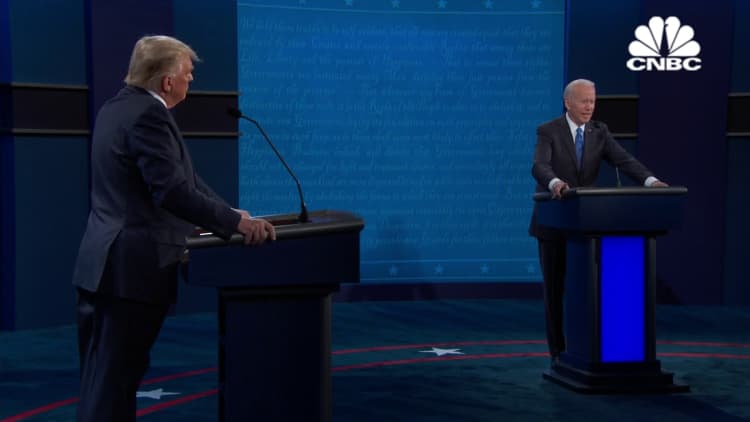One winner emerged in Florida's election that wasn't President Donald Trump or former Vice President Joe Biden.
It was the $15 an hour state minimum wage.
The initiative passed on Tuesday with 60.8% of the vote, just over the 60% minimum required for approval.
The approval rate surpassed both Trump's and Biden's support in many parts of the state. Florida's popular vote went to Trump, who received 51.2% of the votes, versus Biden, with 47.8%.
The result "says a lot about how much voters in both parties are looking for government and policy makers to do something about the state of wages in America right now," said David Cooper, senior economic analyst at the Economic Policy Institute, an independent, non-profit think tank.
More from Personal Finance:
Here are the top 5 U.S. cities for retirement
Three things to keep in mind to handle market volatility
These hidden fees take bite out of retirement savings
"People want to see their pay checks grow, and this is a very easy, straightforward way to do it for a lot of people," Cooper said.
Florida's minimum wage will gradually increase. It will not reach $15 per hour until 2026.
As of now, Florida's minimum wage is $8.56 an hour. With Tuesday's vote, that will rise to $10 per hour on Sept. 30 next year. From there, it will increase $1 per year up to 2026.
The federal minimum wage is currently $7.25 per hour.

The change will put the Sunshine State on a short list of states that have enacted a $15 per hour minimum wage. Other states that have approved the same minimum include California, Connecticut, Illinois, Maryland, Massachusetts, New Jersey and New York.
Notably, Florida did not have a state minimum wage until 2004. Currently, that base rate gets a cost of living adjustment every year. But some say it is not enough.
The $8.56 per hour rate is too low, said Ben Pollara, senior advisor at Florida for a Fair Wage, which led the campaign for the change. "People who were going to work in a full-time job deserve the dignity of being able to put food on the table for themselves and their family," he added.
The group is led by John Morgan, a Florida lawyer who put in $6 million of his own money to get the issue on the ballot and approved.
Good for workers, bad for business?
The average hourly starting wage in Florida is currently more than $10, Pollara said. Larger employers typically have higher minimum rates. WalMart and Publix, for example, start at $10.50 per hour, while Target's minimum is $15, Pollara said.
The new official minimum wage is expected to immediately help 2.5 million Floridians. That includes people who work at cash registers, stock shelves and clean up at places like nursing homes, according to Pollara.
"Our hope is it's good for working people and the impact is not felt that much by small business," Pollara said.
But others, such as the Florida Restaurant and Lodging Association, have expressed concern about negative effects the new policy could have.
Given the devastating impacts Covid-19 has already had on Florida's economy, we are extremely worried about the job losses and business closures that will accompany this mandate.Carol DoverCEO of the Florida Restaurant and Lodging Association
Florida has lost 336,000 jobs due to Covid-19, according to an economic analysis cited by the industry group. This change could lead to another 158,000 jobs going away.
"Given the devastating impacts Covid-19 has already had on Florida's economy, we are extremely worried about the job losses and business closures that will accompany this mandate," Carol Dover, president and CEO of the Florida Restaurant and Lodging Association, said in a statement.
Yet many academics, along with advocates such as the Economic Policy Institute, have been calling for a $15 per hour federal minimum wage for some time.
Cooper said small businesses should not be adversely affected because they will all undergo the change together. Research shows most businesses are able to adjust, he said.
Recently, a bill called the Raise the Minimum Wage Act was passed by the House of Representatives. If signed into law, it would raise the federal minimum wage to $15 an hour by 2025. But it's unclear whether the measure can advance in the Senate.
Such a change would be an important move, Cooper said, due to the fact that the buying power of the federal minimum wage had been eroding over time. In the 1960s, it was equal to about half the median wage. Today, it's about a third, he said.
The result is that someone in a low-wage job today is much farther from the middle class.
"We do know that low wage workers are disproportionately women, and they are disproportionately people of color," Cooper said. "So we know that raising the minimum wage is going to help those folks disproportionately."


